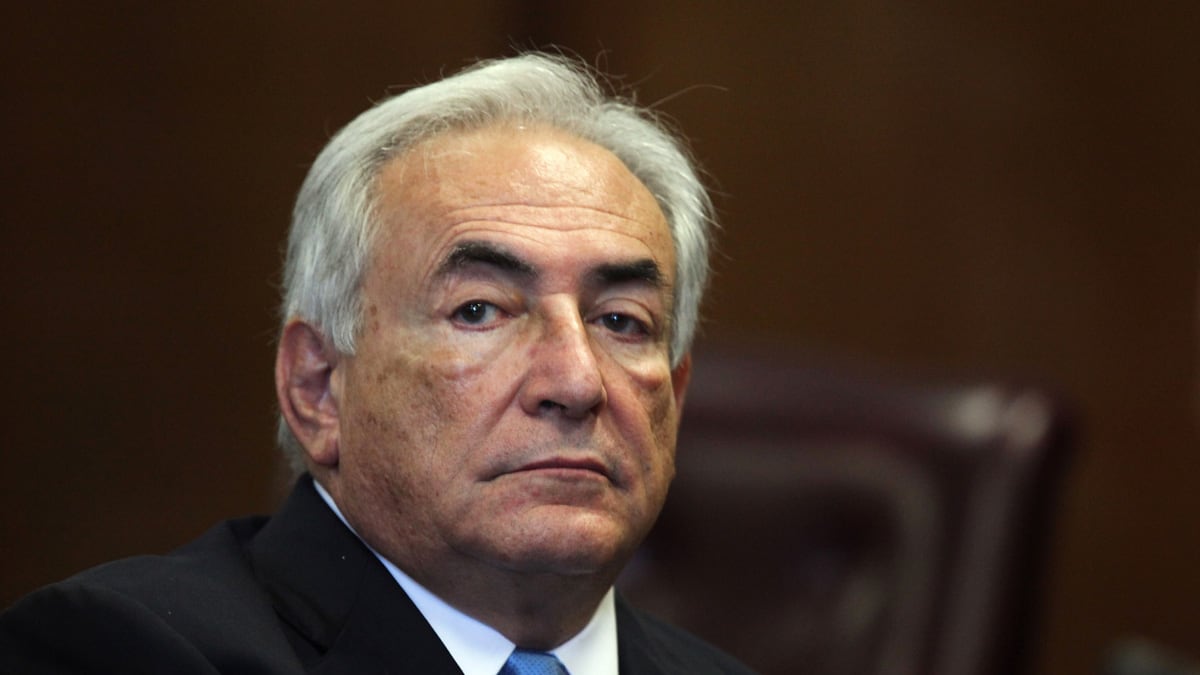With former International Monetary Fund chief Dominique Strauss-Kahn freed on his own recognizance in the United States, and the case against him in the attempted rape of a New York hotel maid on May 14 suddenly teetering, there is a single question on every stunned observer's mind here in France: could he still be president? Until seven weeks ago, everyone from TV talking heads to people in serious think tanks and zinc bars in village cafés wondered whether DSK would opt to run for the French presidency in 2012. After his arrest, the dream was buried—until Friday morning. But whether or not the State of New York sends Strauss-Kahn home free, there is a second question that helps answer the first: is this man too careless to be president?
On May 19, Strauss-Kahn, facing international pressure, resigned as managing director of the IMF in a letter written from jail on Rikers Island. Incredibly, this wasn't the first time Strauss-Kahn had had to leave a job he excelled at on the back of charges that later fell apart. It wasn't the first time Strauss-Kahn had made questionable decisions—DNA evidence shows Strauss-Kahn had sex with the Sofitel maid, whether or not he tried to rape her—that spiraled into much worse for a devastating stretch in the eyes of the law. And it isn't the first time his blindingly bright future has been jeopardized by his own mistakes.
In 1999, Strauss-Kahn was France's finance minister, a star of Lionel Jospin's Socialist government, and primed for big things. He was being mooted for the 2001 mayor's race in Paris, seen as a fine steppingstone to the presidency, or as prime minister should Jospin win the presidency in 2002. But in November 1999, he was forced to step down quickly to save the government from embarrassment (sound familiar?). He was facing a fraud investigation. “If I am resigning, I say this forcefully, it is in no manner because I feel I am guilty,” he told assembled press at the ministry, with his wife, Anne Sinclair, steps away then as now. He was suspected of forging documents about legal work he had done for a student-health-insurance group in real-estate negotiations. There were questions about whether he had actually done the work, for which he was paid about $100,000, and whether he'd forged documents after the fact to prove he had.
At the time, The Economist, typically far from effusive about French Socialists, bid “a sad adieu” to “the polyglot Mr. Strauss-Kahn,” “the perfect man to smooth-talk journalists and placate suspicious foreigners,” “the urbane DSK,” “the pragmatic intellectual, able somehow to persuade suspicious ideologies of the need to embrace the euro, privatize state champions, cut taxes, allow stock options—all, admittedly, within a program that also aimed at EU-wide tax harmonization and posited that free markets should be tamed.” It concluded by lending enormous credit to the brilliant economist with a suddenly hazy future: “In short, Mr Strauss-Kahn will be missed. Just before he bowed out, he had predicted: 'If we don't do anything stupid, France can enjoy rather a long period of growth—six or seven years or so.' What a pity if his own mistakes risk stunting that growth.”

In fact, Strauss-Kahn admitted to investigating magistrates that he had backdated documents, but without criminal intent. The prosecution's case eventually fell apart, and in November 2001 the case was dismissed. But it took two years. Strauss-Kahn told biographers Alexandre Kara and Philippe Martinat last year, “I stumbled upon two judges that had a belief from the start based on not much and didn't want to change it.”
(He may have been luckier with a quicker district attorney's office in New York this time around, the window of opportunity still open to enter his Socialist Party's primary race—candidates must declare by July 13, and some Socialist officials, including frontrunner François Hollande, are proposing the party wait for its prodigal suspect.)
By November 2001, Paris already had a new mayor. And six months later a glut of leftist candidates would split the Socialist vote in the 2002 presidential election, leaving Jospin out of the presidential runoff and Strauss-Kahn without a chance at the prime minister's office. Strauss-Kahn was left to rebuild. He lost the primary for the 2007 election. But from 2007 onward, shepherding the International Monetary Fund through the worst crisis in living memory was his renaissance. (Indeed, under his able stewardship, it was the IMF's renaissance, too.) Until his world seemed to come crashing down seven weeks ago, the IMF role and Sarkozy's chronic unpopularity appeared to make DSK a shoo-in for the presidency.
“Appeared,” however, is the operative word. As we argued in a Newsweek International cover story last October, despite glowing poll numbers, Strauss-Kahn's path to power would be far from obstacle-free. Back then, his future was again dreamily bright. A columnist in the French weekly L'Express laid out his heady options: “Either DSK serves France by declaring his candidacy for the presidency, or he serves it, as well, by saving the global economy at the IMF. It’s a grandiose dilemma of the sort any politician might dream.” There was no inkling then, of course, that what Strauss-Kahn would actually serve was time. But there were caveats. And the shocking ordeal of the past seven weeks, even were it to end as soon as his next court appearance, on July 18, has only emphasized some of those caveats.
Sure, Strauss-Kahn returning to France as the bona fide victim of spurious accusations would lend him the aura, the fresh momentum, of a comeback kid. For a time. One question mark well before the Sofitel affair was whether Strauss-Kahn, a good leader, even a plausible statesman, was in fact a good politician, or whether he had any real talent for the campaign trail. On substance, one longtime former DSK colleague argued in October (hauntingly with hindsight) that “Strauss-Kahn has a real ability to defeat himself.” We haven't seen him in action yet this time—although opting to have sex with an unknown chambermaid, consensual or otherwise, less than two weeks before most expected he would announce his candidacy, after the G8 summit in his native France, would plainly go against the advice of any campaign manager. Like Strauss-Kahn's affair with a married subordinate, Hungarian economist Piroska Nagy, in the very first months of his IMF term, reportedly including “inappropriate” emails, it was at best careless. And Nicolas Sarkozy, the incumbent and likeliest nominee on the right wing in 2012, is anything but a careless campaigner. Just ask Ségolène Royal, who beat out Strauss-Kahn for the last Socialist nomination only to be crushed by Sarkozy in 2007, what she thinks of the French president's well-oiled campaign machine.
French voters, typically, are willing to give plenty of leeway to politicians sowing wild oats extra-conjugally. Many French people even brandish such with pride as a difference from supposedly “puritanical” Americans, impeaching a president for Oval Office hanky-panky. That is the reason Strauss-Kahn's skirt-chasing was always considered (short of committing a felony) a minor concern. Rape or attempted rape is, of course, well beyond skirt-chasing and far over the line of what voters could abide. But if Strauss-Kahn's case is dismissed, or deflated to a misdemeanor, the question will be how thick that line is, in fact. Since DSK's arrest, the intense discomfort of some women who have dealt with him personally and professionally has been aired well beyond Paris dinner parties. Who else does that discomfort make uncomfortable?
More problematic historically is Strauss-Kahn's relationship with his Socialist Party's supporters and more radical rivals on the left wing. Winning that support is key not only to winning the primary but to getting past the first presidential round next April. It was always going to be a challenge for Strauss-Kahn, returning from the IMF arguably out of touch with “real people,” even had he made his triumphant return on schedule last month. But the unexpected delay has stoked ambitions in the Socialist Party, with rivals who might have desisted in favor of Strauss-Kahn weeks ago having now thrown their names into the primaries' hat. And there is the trouble with Strauss-Kahn's money, or more accurately his heiress wife Anne Sinclair's fortune. Strauss-Kahn was derided in early May in Paris, days before his arrest, when he was photographed beside an associate's slick Porsche Panamera on Paris's posh Place des Vosges, where Strauss-Kahn and Sinclair have long kept an apartment, if discreetly. And that was before the couple very publicly, and without any obvious difficulty, posted a $6 million cash bail and bond and shelled out $200,000 a month for the private security team the defense had to promise the judge and a $50,000-a-month Tribeca apartment for DSK's house arrest. Poor street cred when your party is trying to seduce voters away from leftist rivals like the New Anti-Capitalist Party, whose best-known member is a postman, and Workers' Struggle.
Strauss-Kahn's sudden, astounding, and very definitive-seeming fall might make an optical illusion of his comeback rise. Facing decades behind bars, Strauss-Kahn seemed so resolutely out of the race only hours ago, his chances so emphatically shattered, that the real challenges that remained on the road to the Elysée could be overlooked. Defeat snatched from the jaws of sure victory is more romantic a tragedy than defeat snatched from who-knows. But it is a fact that, after four years as IMF chief sworn to public silence on French policy and seven weeks behind bars or under house arrest, French voters have yet to hear Strauss-Kahn give a single opinion on the domestic issues they face. His future looks much brighter than it did Thursday. Indeed, much more of it may be up to him. But that, as we've seen, isn't necessarily saying much.






